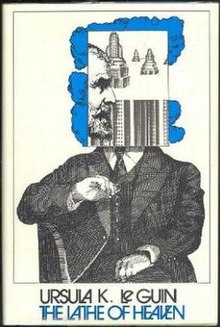The Lathe of Heaven

Cover of first edition (hardcover)
|
|
| Author | Ursula K. Le Guin |
|---|---|
| Country | United States |
| Language | English |
| Genre | Science Fiction |
| Publisher | Avon Books |
|
Publication date
|
1971 |
| Media type | Print (Hardcover & Paperback) |
| Pages | 184 pp |
| Awards | Locus Award for Best Novel (1972) |
| ISBN | |
| OCLC | 200189 |
The Lathe of Heaven is a 1971 science fiction novel by Ursula K. Le Guin. The plot revolves around a character whose dreams alter reality, including past events. The story was first serialized in the American science fiction magazine Amazing Stories. The novel received nominations for the 1972 Hugo and the 1971 Nebula Award, and won the Locus Award for Best Novel in 1972. Two television film adaptations have been released: the acclaimed PBS production, The Lathe of Heaven (1980); and Lathe of Heaven (2002), a remake produced by the A&E Network.
The title is taken from the writings of Chuang Tzu — specifically a passage from Book XXIII, paragraph 7, quoted as an epigraph to Chapter 3 of the novel:
To let understanding stop at what cannot be understood is a high attainment. Those who cannot do it will be destroyed on the lathe of heaven. (知止乎其所不能知,至矣。若有不即是者,天鈞敗之。)
Other epigraphs from Chuang Tzu appear throughout the novel. Le Guin chose the title because she loved the quotation. However, it seems that the quote is a mistranslation of Chuang Tzu's Chinese text. In an interview with Bill Moyers recorded for the 2000 DVD release of the 1980 adaptation, Le Guin clarified the issue:
...it's a terrible mistranslation apparently, I didn't know that at the time. There were no lathes in China at the time that that was said. Joseph Needham wrote me and said "It's a lovely translation, but it's wrong".
She has published her own rendition of the Tao Te Ching, The Book of the Way and Its Virtue by Lao Tzu, the traditional founder of Taoism (Daoism). In the notes at the end of this book, she further explains this choice: "The language of some [versions of the Tao Te Ching] was so obscure as to make me feel the book must be beyond Western comprehension. (James Legge's version was one of these, though I did find the title for a book of mine, The Lathe of Heaven, in it. Years later, Joseph Needham, the great scholar of Chinese science and technology, wrote to tell me in the kindest, most unreproachful fashion that Legge was a bit off on that one; when the book [Tao Te Ching] was written the lathe hadn't been invented.)"
...
Wikipedia
